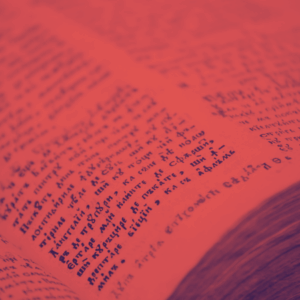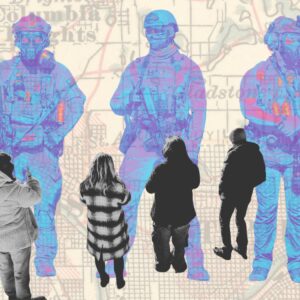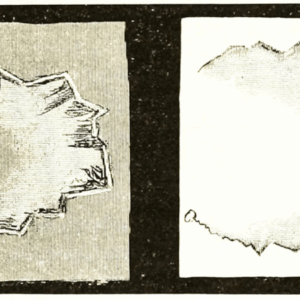
On Danticat, Camus, and the Art of Exile
Gabrielle Bellot Reminds Us That Immigrant Art is American Art
“Create dangerously,” the Haitian writer Edwidge Danticat famously wrote in her 2010 nonfiction collection of the same name, “for people who read dangerously. This is what I’ve always thought it meant to be a writer. Writing, knowing in part that no matter how trivial your words may seem, someday, somewhere, someone may risk his or her life to read them.”
For Danticat, this mantra applied to writers in general, but it hewed especially close for immigrant writers, like herself, as she had been in Haiti but fled with her family to New York when she was 12. Exile, in particular, obsessed her, feeding her creation myths, her dreams, her books. “All artists, writers among them, have several stories—one might call them creation myths—that haunt and obsess them,” she wrote, noting that even the myth of Adam and Eve—the “biggest creation myth of all,” she calls it—is about “banishment, exile.” Had they been executed for taking a bite of that fabled fruit of moral knowledge, she notes, the story would have been over; the story lived on because it was about exile rather than execution, just as so many stories, at core, bloom out of some form of banishment or expulsion.
When you leave a place, Danticat suggested, this is not when a story ends, but, rather, when it really begins, or, at least, begins anew.
It was apposite that Danticat saw exile in so central a light. To be an immigrant is to always live in some state of exile, even if its shadow seems to have grown faint inside us; you cannot forget your old homes, no matter how comfortingly familiar your new destination becomes, or you may end up feeling less at home in your new world than in the one you left. You may feel like a liminal figure, a foot in two worlds (or, with some moves out of Existential Twister, more worlds than that). You may feel like you have changed, or like your old home has, should you return, and you learn that the past is never really as solid as a photograph or a mirror, but something fractured, phantasmal, something less flesh than ghost, and as a result, we cannot hold onto it easily, cannot know, for sure, that our past will mean the same thing today as it will tomorrow, for it changes as we do, darkens and lightens as our interiors shift. Exile will always define the experience of being an immigrant at some level, small or large. For Danticat, that meant remembering that even those of us who escaped from tyrannical regimes and got a chance at a more peaceful life have the ability and right to speak up. No matter where you are, you can speak and write about injustice—and someone, somewhere, may risk their life, as she said, to gain strength from your words.
We must speak, even when we fear the nightmares our words may bring us; we must speak, so that we give someone else a chance, days or decades later, to feel similarly emboldened against the sights and sites of blood and corruption. Speak, like releasing a moth into the world, so someone else may live, drawn by its light wings.
I think of Danticat more and more today, as I see the President’s son posting on social media that zoos work because of walls, so what’s wrong with borders, a patently racist comparison that disgustingly implies immigrants and refugees are no different from wild animals. I think of her when I see the President, disgraceful and disembarrassed of embarrassment, shut down the government for the longest period in American history because he wants funding for a border wall to keep immigrants out and prevent a “crisis” of brown people coming in—despite the fact that it is legal for asylum-seekers to seek asylum and that there is no crisis, that this crisis language is code for old white-supremacist fears about nonwhites “taking over.” I think of how deeply his base supports these baseless, gormless statements, even when some of them are suffering or not getting paid because the government is shut down. I think of how we waste time policing the language of Democrats like Rashida Tlaib, who said that we must “impeach the motherfucker,” when the dehumanizing, misogynistic language employed by the administration makes anything Tlaib uttered pale in comparison.
I think of how many people still do not understand what it is like to flee one country and seek asylum in another—how even the journey itself is perilous, how the people beside you may rot away until they are dead, how even when you reach the gates of your destination you are far from safe.
Danticat captured the funereal horrors of the journey from one country to another in “Children of the Sea,” a beautiful, heart-wrenching story from her short story collection, Krik? Krak! Composed of letters, the epistolary tale follows two Haitians: a man who has fled on a boat with other Haitians because his anti-government radio broadcasts have made him a target of murder by the country’s mythic, murderous militia, the Tonton Macoutes; and a girl who has remained in the island with her family, enduring the brutalities of the Macoutes as they go from house to house, raping and killing political dissidents. The two are in love.
I think of how many people still do not understand what it is like to flee one country and seek asylum in another.
The male writes in more formal sentences, describing the slow descent of the ship he is on as people die, including newborn babies, swallowed by disease and sea alike. She responds in less formal punctuation, eschewing capitalization, words bolded against the page, telling him of how her father hid with them one night as the Macoutes attacked, and they had to listen to a neighbor, Madan Roger, being brutalized; she is furious with her father at first for not fighting the Macoutes, then she learns they were originally coming for her to brand her as politically disloyal, and they only left her alone because he paid them everything he had. Evil has become banal, morality chiaroscuro. According to her, butterflies signify life if they are white and death if they are black; at the end of the piece, when it seems the man has sent his final missive to her, she sees a vast swarm of black butterflies, and her heart breaks, knowing the asylum-seekers have perished. They have become “children of the sea,” devoured by the omnivorous maw of the waves.
So often, the conservative media paints immigration as a kind of joyride from one country to another, wherein the immigrants will “steal” jobs and live off the government’s handouts—a heartless picture that ignores how treacherous many immigrants’ journeys are. How many immigrants who flee out of terror do so because they feel it is the only way to have a chance at safety or to give their children a chance at what they never had, not because they simply wished to take some long vacation. Of course, there is no single reason for people who immigrate, and romanticizing does not help much more than right-wing scapegoating. But the fact is that people don’t usually immigrate on a whim, and there are very real reasons for seeking asylum, reasons that more comfortably situated persons may not be able to imagine unless they read something like Danticat’s lovely, grisly story (though, even then, the most ideologically committed may not empathize).
The irony, of course, is that exile is inextricably, eternally American, in the sense that every American, at some level, is connected to or by it. Exile is not simply American; exile is America. People flee countries for America, and, very visibly in the present, flee America and its bigotries for elsewhere. Americans who have never left the country frequently know little about the wider world (though this was also true of the country I came from, Dominica), exiled from it by their own immobility; Americans on the coasts and in cities may feel a sense of urgent division between their populations and those in the rural areas, as the former tends to lean liberal, the latter conservative, creating an ever-deepening sense of political exile between city and countryside, person and person, stereotype and stereotype.
All of this is true of other countries to varying degrees. It is deeply true of America, which has always thrived on exile since its days of genocide and slavery, the blood and screams its cities and rural towns alike drank deep in order to sprout tall.
If immigrants have a special, obvious connection to the concept, it is no less true that America itself is a land of exile and may always be one, unless some panacea can heal old scars that have burned red for centuries. Perhaps that panacea exists; perhaps we are moving towards healing, and the world today represents the death throes of conservative bigotry. Or, perhaps more plausibly, we simply have no way of knowing what the future will hold, and so we must fight and write and speak, rather than assuming all will be more or less okay.
Danticat’s words echo something the late Amos Oz wrote in his partly autobiographical novel A Tale of Love and Darkness. “When I was little, my ambition was to grow up to be a book,” the passage reads. “People can be killed like ants. Writers are not hard to kill either. But not books: however systematically you try to destroy them, there is always a chance that a copy will survive and continue to enjoy a shelf-life in some corner of an out-of-the-way library somewhere in Reykjavik, Valladolid or Vancouver.” Literature, as the old adage goes, lives long after we cease to—not as romantically as that may sound, but in a way that’s nonetheless true.
But books cross borders more easily than people do, even when they are banned, particularly in the narrow-minded age we live in. Conservatism, in general, tends to inflate the notion of borders as necessary gates or barriers that keep out, yet borders are nothing special in of themselves; they must exist if countries are to be defined by geographic limits—a basic component of a nation, or what Benedict Andersen famously called an “imagined community” in his book of the same name, so named “because the members of even the smallest nation will never know most of their fellow-members, meet them, or even hear of them, yet in the minds of each lives the image of their communion.”
America itself is a land of exile and may always be one, unless some panacea can heal old scars that have burned red for centuries.
But a border that is too rigid becomes little more than the wall around a fortress, or a prison. Life is lonely and narrow in such a structure. We are strengthened by interacting with others, particularly those dissimilar from ourselves. If our walls are too thick and spiked with a cheval-de-frise of bloody glass and thorns, we will gradually cease to be a place people wish to enter—as America is already becoming, because Trump’s selfish “America First” policy does nothing but push other nations away, laughing at the self-indulgent stupidity of America’s elected leader.
How ironic that those who call most fervently for a rigid border wall must wish, subconsciously, to live in a cage themselves, for that is what the most fearful of those calling for walls envision, a place safe from the barbarians they imagine slavering and slobbering at the gate like rough slouching beasts, a fortress neither entered nor left, a place indistinguishable, at core, from a large yet cramped prison of mind and body alike.
*
Danticat borrowed the title of her collection from a lecture and later essay by Camus, which he delivered in Uppsala in 1957. “To create today is to create dangerously. Any publication is an act,” Camus, whose works were steeped deeply in an atmosphere of existential exile, declared. Exile was his desert star: his characters are lonely, abandoned, attempting, often fruitlessly, but with the absurd determination of Sisyphus, to achieve their desires, as in his short story “The Guest,” his novels The Plague and The Stranger, and philosophical meditations like The Myth of Sisyphus. In the lecture, Camus focused less on existentialism (though he claimed in a 1945 interview that he was not an existentialist and that people should stop pairing him with Sartre) than on the ageless question of how art and politics are connected.
In the past, Camus claimed, “the artist was on the sidelines. He used to sing purposely, for his own sake, or at best to encourage the martyr and make the lion forget his appetite. But now the artist is in the amphitheater.” Although some of what Camus is expressing here is tongue-in-cheek, it is also clear that he is romanticizing history, ignoring or unaware of the many writers who directly created art out of politics, the many writers who knew, or had no choice but to know because of their conditions, that the personal is political. Were Olaudah Equiano or Frederick Douglass or James Baldwin or Lorraine Hansberry on the sidelines? Later, Camus argues—again, both accurately and with some tone-deaf reductivism—that art in the West has come to a point where it can no longer easily avoid political engagement:
Among the best explanations is the feeling the contemporary artist has of lying or of indulging in useless words if he pays no attention to history’s woes. What characterizes our time, indeed, is the way the masses and their wretched condition have burst upon contemporary sensibilities. We now know that they exist, whereas we once had a tendency to forget them. And if we are more aware, it is not because our aristocracy, artistic or otherwise, has become better—no, have no fear—it is because the masses have become stronger and keep people from forgetting them.
Art, Camus claims, is not owned by the privileged, and a literature that encompasses everyone is a stronger art. “In the face of so much suffering, if art insists on being a luxury, it will also be a lie,” he said. He continued that “if there is any man who has no right to solitude, it is the artist. Art cannot be a monologue… Art advances between two chasms, which are frivolity and propaganda.” Towards the end, Camus noted that “all greatness, after all, is rooted in risk. The time of irresponsible artists is over.” In a line that has stayed with me, Camus cuts to the core of what great art must aim for, regardless of its author or ken: “[t]he aim of art… is not to legislate or to reign supreme, but rather to understand first of all.” Art does not seek to dictate the rigid laws of a society; instead, it must seek to try to capture something true about the world it conjures up. Camus goes on to condemn art crafted purely out of hate. We must do the opposite of hatred, which, as I said after Trump’s election, is not love, but empathy, understanding.
Immigrant art is always important, but it is more urgent now than ever in America and beyond. In this toxic atmosphere of anti-immigrant sentiment, we must speak out, must write the work that drives us. We must create dangerously, as Danticat said, so that, perhaps, one day the sky will be clouded with a few less night-dark butterflies than before, not because of some naïve presumption that art always saves lives, but because art does, in fact, save lives, often when we least expect it to. Like Camus and Danticat, we must attempt, above all, to understand; without this, there is no art, but only a sky filled with thousands of butterflies we cannot begin to comprehend.
Gabrielle Bellot
Gabrielle Bellot is a staff writer for Literary Hub. Her work has appeared in The New York Times, The Atlantic, The New York Review of Books, The New Yorker, The Paris Review Daily, The Cut, Tin House, The Guardian, Guernica, The Normal School, The Poetry Foundation, Lambda Literary, and many other places. She is working on her first collection of essays and a novel.












